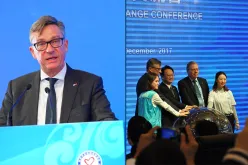Around 250 participants from 30 countries gathered today in Beijing, China, for the opening of the 2nd International Volunteer Service Exchange Conference. Under the framework of South-South Cooperation, representatives from governments, volunteer involving organizations, academic institutions, the private sector and UN agencies will exchange experiences and ideas to leverage volunteerism for sustainable development and continue the dialogue that began in 2015 at the first edition of the conference.
The two-day conference is co-hosted by the United Nations Volunteers (UNV) programme and the Beijing Volunteer Service Federation (BVF), and aims to continue building a strong Southern constituency and voice in international volunteering and co-create new ideas on how volunteering can be effectively mainstreamed to support national development priorities by low- and middle-income countries. It also aims to identify new opportunities for innovative partnerships to jointly overcome development challenges through international volunteering.
Furthermore, the conference will provide opportunities for peer learning, sharing good practices and partnership building, contributing to the creation of new dynamics for deeper civic engagement to achieve the Sustainable Development Goals (SDGs) along with China’s flagship international development project “Belt and Road Initiative (BRI)”. BRI is based on five integrated pillars: policy coordination; facilities connectivity; unimpeded trade; financial integration; and people-to-people bonds. This last pillar provides a substantial opportunity to explore how people-to-people exchange and volunteerism can provide a bottom-up, people-centered approach to sustainable development. Participants will explore together how China, the United Nations system, and BRI countries can collaborate around volunteering and people-to-people exchange projects.
“More and more volunteers serving abroad are coming from middle-income countries, with experience and expertise that is particularly well-suited to sharing with other developing countries that are facing similar challenges and constraints. Middle-income country governments also recognize that not only can volunteer exchange strengthen bilateral and regional ties between countries: volunteering itself also develops skills and expertise for the individual volunteers, who then bring them to their own communities when they return home,” said UNV Executive Coordinator Mr. Olivier Adam.
In China's case in particular, the Belt and Road Initiative is a new channel for Chinese volunteer involving organizations to extend their work and develop new partnerships. This momentum provides exciting new opportunities for volunteering to add significant value to South-South Cooperation, as both methods of engagement share common ideals of mutuality, respect, and equality." Mr. Olivier Adam, UNV Executive Coordinator.
He added, “Leading governments such as China offer more formal support for the expansion of the role of volunteer sending organizations in overseas development aid. In China's case in particular, the Belt and Road Initiative is a new channel for Chinese volunteer involving organizations to extend their work and develop new partnerships. This momentum provides exciting new opportunities for volunteering to add significant value to South-South Cooperation, as both methods of engagement share common ideals of mutuality, respect, and equality.”
Mr. Nicholas Rosellini, UN Resident Coordinator and UNDP Resident Representative in China, also acknowledged the value of volunteerism in both the SDGs and BRI: “While the nature and scope of the 2030 Agenda for Sustainable Development and the Belt and Road Initiative are different, there is strong alignment between the principles underlying the two, such as their focus on inclusive and sustainable economic growth and social development, cooperation and collaboration, and shared visions of a more sustainable world. One of the pillars of the BRI – people-to-people exchange – echoes SDG 17 Partnerships for the Goals and offers considerable scope for the involvement of volunteers in advancing the implementation of sustainable development through the BRI platform.” “China's support for engaging volunteers in China's development aid and BRI activities abroad will ensure that they are participatory, mutually beneficial and aligned with the SDGs, helping to fully realize the potential of South-South Cooperation,” he added.

